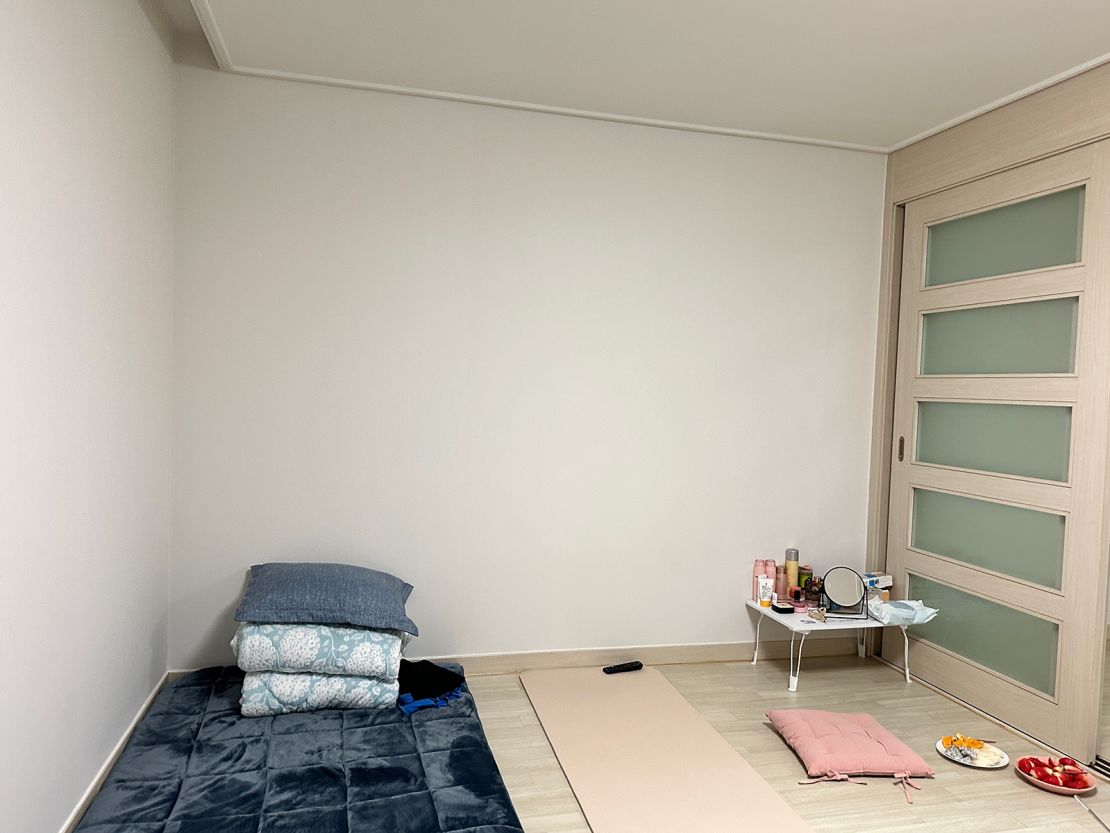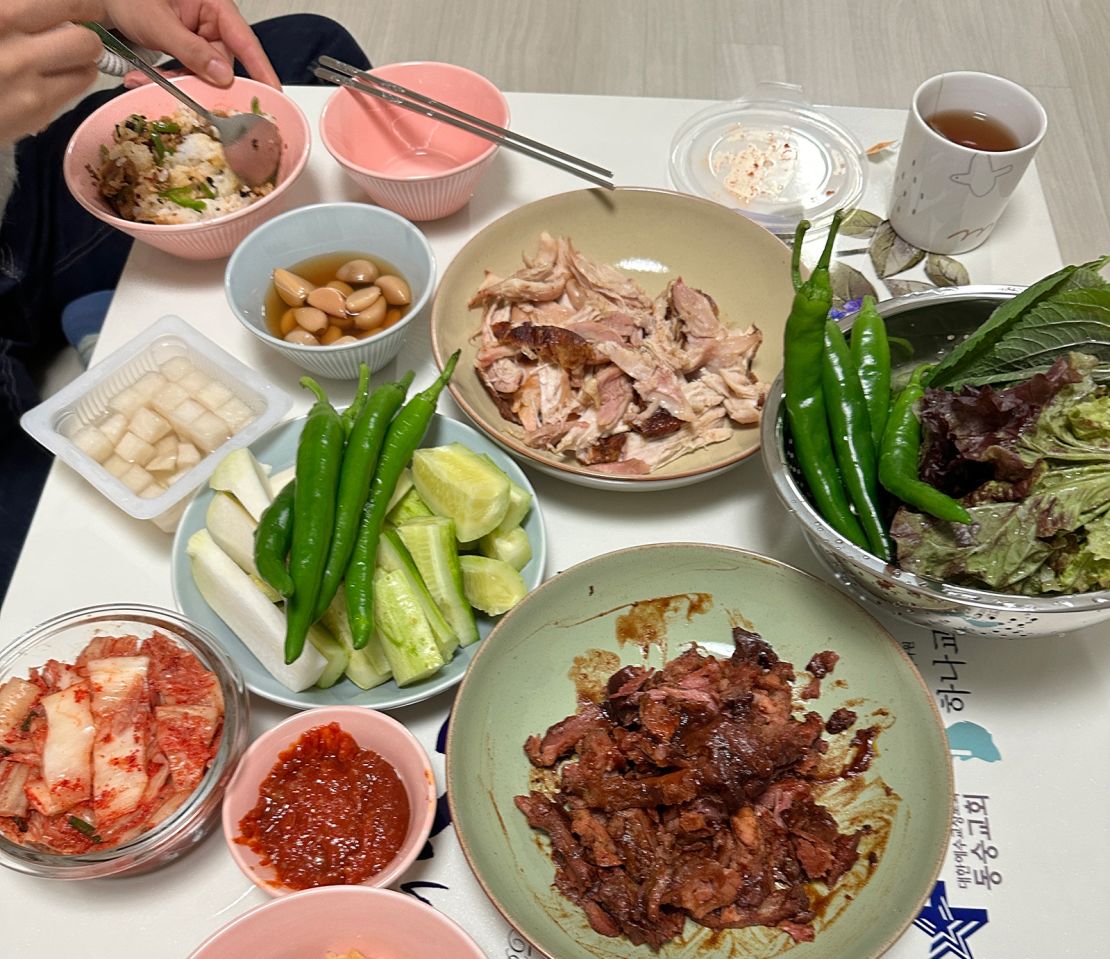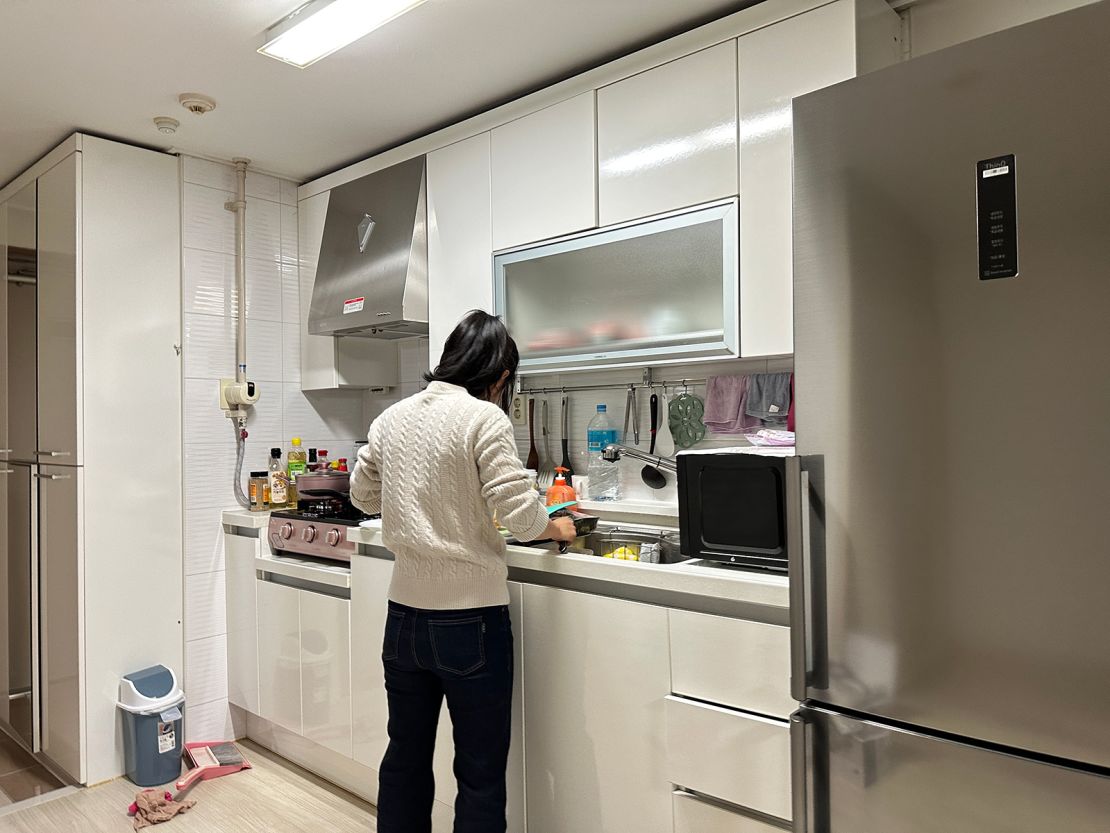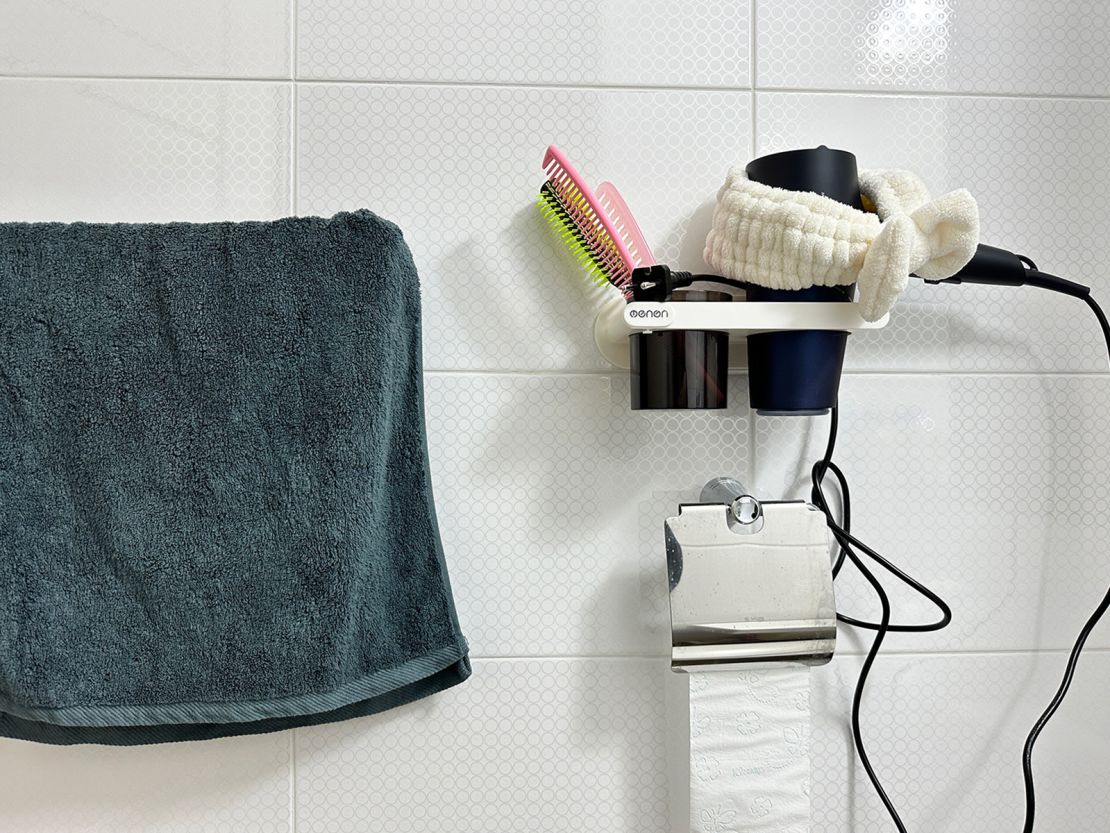Seoul, South Korea
CNN
—
Chae-ran sets the plate of sliced oranges and dragon fruit on the floor, a few feet from the pile of bedding where she sleeps.
At 35 years old she is starting over again, alone in a foreign country, without so much as a photograph or letter from her old life – just a sparse room with bare white walls. But it’s home, and the first place she’s had to herself after a life lived in the shadows.
Chae-ran is among a number of women who fled North Korea – only to be trafficked and sexually exploited in China, where a gender imbalance has created a black market for brides.
She managed to stage a second escape nearly two decades later, through Laos and Thailand. But opportunities for others to take the same path have narrowed since the pandemic, experts say – leaving untold numbers of North Korean girls and women trapped in servitude.
CNN is identifying Chae-ran by a pseudonym for the safety of her family back in North Korea – and the son she left behind in China.

Escape and exploitation
Chae-ran made her first escape after finishing high school. She’d been assigned a job at a coal mine, like her father and most people in their village near the Chinese border – but the teenager didn’t want to spend her life doing hard labor, deep underground.
She’d seen other villagers crossing the river that separates North Korea from China to find work and wanted to help support her family. So, one day, without telling her mother, she and a friend left home with the help of a broker – people who plan and facilitate the journey out of North Korea for a fee. She remembers it was early evening in autumn; the sky was still light when she crossed the river.
But upon reaching the other side, she and her friend were put into cars and driven into northwestern China, where they were given a choice, she said: entertain customers at a bar, or marry a Chinese man.
“I wanted to cry but I knew nothing could change even if I did,” she said, speaking in Korean during a conversation with CNN. “I thought I couldn’t work at a bar so that left me only one option, marrying a Chinese man.”
Shortly afterward, Chae-ran says she was separated from her friend, who she never saw again, and introduced to the man who had bought her, a Chinese farmer eight years her senior.
“I didn’t like the man because he was short, but I didn’t want to be sold again so I stayed quiet,” she said.
She was brought to the man’s village, in the mountains of northeastern Hebei province, close to the capital Beijing. “Honestly, they seemed poorer than my family,” she said. “The houses in the village were made from mud and stones, and the windows didn’t have glass but thin paper.”
Since she couldn’t speak Chinese, she couldn’t communicate with the farmer or his family, and felt she couldn’t run away. That was 17 years ago.
Many like Chae-ran leave their isolated home nation hoping to find freedom and opportunity once across the Chinese border, only to be trafficked by the brokers they hired. One 2019 investigation by the London-based Korea Future Initiative (KFI) claimed that tens of thousands of North Korean girls and women were being exploited this way, including some as young as 12.
Men far outnumber women in China, largely due to its former one-child policy and families’ traditional preference for sons. Human traffickers are reportedly attempting to fill that gap by selling North Korean girls and women – some into marriage, while others are enslaved in brothels or made to perform graphic acts on webcams, according to researchers and organizations that help refugees.
Once a victim enters a forced marriage, she is often raped, given no choice but to have children, and compelled into domestic or manual labor, according to the KFI report.
CNN was not able to independently verify claims made in the report. Other reports by the US State Department and rights groups including Human Rights Watch have reached similar conclusions.
Chae-ran said her so-called “husband” didn’t treat her badly, but she was required to obey him, and he presented her as his wife. Within eight weeks of being sold, Chae-ran became pregnant. She said she didn’t want to have a child with him and attempted to induce a miscarriage, but failed and gave birth to a son.
“The baby was so beautiful,” she said. “When I saw my pretty baby, I changed my mind.”
She resigned herself to living in China for the rest of her life.
Living in the shadows
There are few ways out for trafficking victims like Chae-ran.
China considers North Korean refugees to be economic migrants, and forcibly deports them back to North Korea – where, as alleged defectors, they face imprisonment, possible torture or worse, activists say.
That forces refugees to live in the shadows, without legal status or protections, often unable to speak the language and with no way to reach loved ones back home.
Chae-ran and her husband’s family moved to a nearby town a few years later, where she found work washing dishes. Later, when she began learning Chinese, she worked at a supermarket, a tea shop and as a food delivery courier.
During that period, she also met other North Korean refugees in the same situation – with their status public knowledge in the village, she said. CNN is not disclosing the location to protect Chae-ran’s identity.
According to the KFI report, the buying of a North Korean wife is “always known to the local community” but rarely reported to authorities. Some locals argue their village would not survive otherwise, given the skewed gender ratio and China’s falling birthrate.
Some refugees in the town, like Chae-ran, had no identification documents and lived under the radar for fear of arrest and deportation back to North Korea – meaning they are often denied job opportunities, access to health care, and the ability to move freely. But, she said, a few others did have documents that gave them better access to resources.
According to researchers and experts, authorities in some parts of China have begun issuing so-called “residence permits” to North Korean women married to Chinese men, for a “considerable financial price.”
These aren’t official state-issued ID cards, but rather a document used by China’s public security forces for surveillance purposes, according to Kim Jeong Ah, a former North Korean refugee who was trafficked in China, and now heads the organization Rights for Female North Koreans (RFNK).
Speaking at the United Nations in September, Kim described how these residence permits allow North Korean refugees to get jobs and use public transport within the region – but not to travel beyond their local area, or to access medical care. She added that many women are coerced or threatened by local authorities into registering for the permit, and face strict government surveillance afterward.
Chae-ran claimed her husband and in-laws refused to pay for the documents, leaving her feeling exposed and fearful of detection by Chinese authorities. She had to be careful not to get into accidents when riding her bicycle; she avoided upsetting local residents who threatened to report her to the police; she felt afraid just seeing a police car.
“I lived in China, but I didn’t exist as a person,” she said.

Life in China only got worse during the pandemic, with the country imposing an unrelenting zero-Covid policy. Residents needed mandatory tests and health QR codes to enter most public places – neither of which Chae-ran could access without identity documents.
When her son’s school asked all parents to submit proof of negative Covid test results, she had to explain to the teacher she was a North Korean refugee. With facial recognition used in parts of China to track individuals’ health status, it felt impossible to hide from the authorities. She confined herself at home, well into the third year of the pandemic.
The pandemic restrictions also made some North Korean trafficking victims more vulnerable to abusive relationships or domestic violence, said Sokeel Park, the South Korea country director for international nonprofit Liberty in North Korea (LINK), which helps North Koreans resettle in the South.
Chae-ran’s son had been the only thing keeping her in China all these years, but she felt she couldn’t keep living in hiding and isolation. When she floated the idea of fleeing to South Korea to her son, then 16, he said he didn’t want to leave.
The other North Korean refugees she’d met in town had connections to brokers who could help them escape, while church organizations and non-profit groups discreetly helped raise funds for the journey. One day last April, she told her family she was going to work; instead, she and a group of refugees fled, traveling across the country to China’s southern border. She didn’t tell her son she was leaving.
From the southern border, they crossed through several neighboring countries and trekked along the Mekong River to Thailand, where they turned themselves in to local police and were put in a Thai detention center.
“It was so hot in the detention center that I even had heat rashes. People in the cell were fighting over everything,” she said. “The hardest thing for us was not knowing when we’ll be able to leave for South Korea.”
A South Korean embassy official helped organize Chae-ran’s eventual journey to South Korea, visiting her and other North Korean refugees in detention and bringing them food. He was the only warm person she met on her long journey to escape, she said, recounting the experience through tears.
In late May, Chae-ran finally arrived in South Korea. Like all North Koreans who enter the South, she underwent security checks and spent time in a facility that teaches defectors to assimilate into society before finally starting her new life in November, six months later.
With financial support from the government, she rented a studio apartment and bought appliances like a washing machine and a television. Churches and non-profit organizations helped her obtain basic goods like winter blankets, utensils and dishes.
Chae-ran was especially excited to receive her South Korean identification documents. “When I got my ID card for the first time, I felt so happy,” she said. “I came to (South) Korea for this one thing, and I finally have it.”

But even with support, adjusting to life in South Korea can often be difficult for refugees.
Some have described struggling with culture shock, loneliness, unemployment or poor working conditions – and hostility from South Koreans, especially in recent years as North Korea has ratcheted up tensions with its neighbor.
In that time, fewer defectors have crossed the border to start a new life. Just 196 North Koreans entered South Korea last year, according to the Unification Ministry – more than the previous two years during the pandemic, but a steep drop from pre-pandemic levels. And most of those defectors left North Korea long ago, staying in third countries for years before arriving in Seoul, according to the ministry.
“It has become much more difficult to escape from inside North Korea,” said Park, from LINK.
Those stuck in China now have fewer avenues of escape because the network of brokers helping transport North Koreans out of the country collapsed during the pandemic, Park said.
Brokers who remain have raised their prices due to increased risks and surveillance, while newcomers to the business are inexperienced, making it a risky gamble for North Korean refugees. That’s not to mention the tightened border security in China and neighboring countries.

For now, Chae-ran is planning for her future. She hopes to one day visit China as a tourist with her newly obtained passport to see her son, who she was able to contact through her sister-in-law in China. She’s received a barista certificate, is working on her driver’s license, and has applied to take a nail care class at the government training facility.
While it can be overwhelming to start from square one – especially in a country with social stigma against North Korean defectors – she’s determined to make it work.
“I’ll face anything, everything,” she said. “I’m aware of discrimination against people like me in this society, but no matter how bad that is, it will be much better than living in China.”

